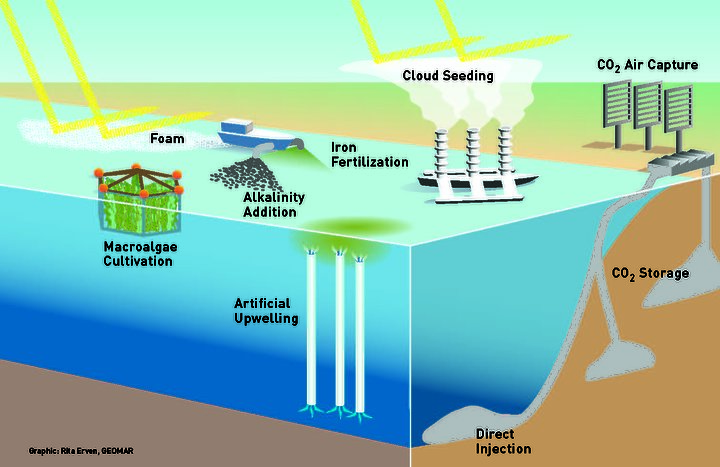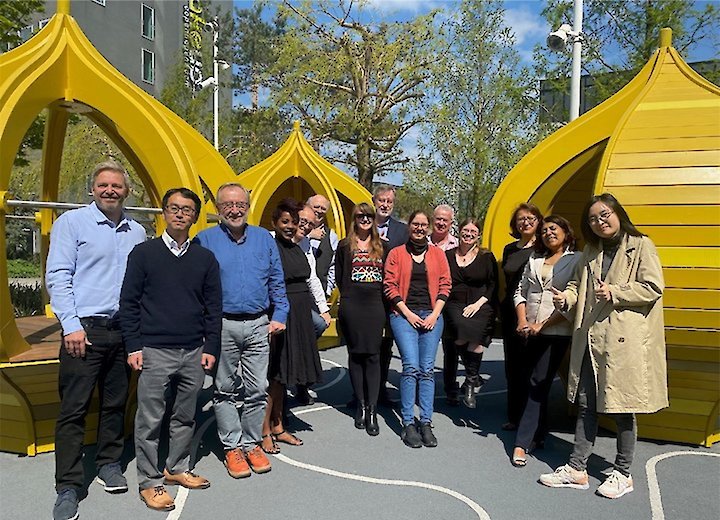Lead agency: International Maritime Organization (IMO), Intergovernmental Oceanographic Commission (IOC-UNESCO) and the World Meteorological Organization (WMO).
Overview
Working Group 41 is a multidisciplinary group of experts who aim to better understand the potential environmental and societal impacts of proposed ocean-based interventions for climate change mitigation.
Since their formation, WG 41 has:
- Carried out an initial review of 27 proposed ocean intervention techniques for climate mitigation that was published in GESAMP Reports and Studies No. 98 “High Level Review of a Wide Range of Proposed Marine Geoengineering Techniques”, published in March 2019.
· Provided advice to the London Protocol Parties to assist them in identifying which proposed interventions may be sensible to consider listing in the new annex 4 of the Protocol so that they could then be regulated,
· Worked to create an assessment framework that will integrate both environmental and societal impacts, thereby helping to holistically evaluate the potential of proposed interventions.
Background
Climate change is having significant impacts on the Earth’s oceans including ocean acidification and warming of the oceans. To address these impacts, various interventions have been proposed to mitigate the effects of climate change on the oceans. Based on the London Protocol, WG 41 defines ocean interventions as deliberate interventions in the marine environment to manipulate natural processes, primarily those intended to counteract anthropogenic climate change and/or its impacts, with the potential to result in deleterious effects, especially where those effects may be widespread, long-lasting or severe. Such interventions have previously been called marine geoengineering.
It is important to be able to holistically assess the potential of these ocean interventions, from both a scientific standpoint as well as a societal impact perspective. This is what WG 41 was created to assist with.
Climate change mitigation interventions are often broadly divided into two groups: those intended to remove carbon dioxide from the atmosphere and those intended to reduce the amount of solar energy that is absorbed by the Earth’s surface.
Carbon Dioxide Removal (CDR) may be achieved using various methods, including:
· Ocean alkalinity enhancement – An activity undertaken to increase the alkalinity of seawater to enhance the uptake of atmospheric CO2 by the ocean. This can be done by adding alkaline-rich minerals to the ocean or by electrochemistry/electrodialysis.
· Ocean sinking of biomass for carbon storage – Ocean sinking of biomass is an activity undertaken to release or sink living or dead biological material to store carbon in the deep ocean..
· Ocean fertilisation – adding plant nutrients to the upper ocean to encourage the growth of phytoplankton, marine organisms that uptake CO2 from the environment.
Solar Radiation Modification (SRM) involves reflecting sunlight back into outer space in order to reduce the amount of heat absorbed by the Earth’s oceans, thereby offsetting anthropogenic climate change effects. Proposed methods to achieve this include:
- Marine surface albedo enhancement is an activity undertaken that introduces reflective material to the ocean, including on or within sea ice, to increase the amount of solar radiation reflected by the ocean.
- Marine cloud brightening is an activity that introduces materials, such as aerosols, into the atmosphere above the ocean to increase the reflectivity or longevity of marine clouds or fog, or to create marine clouds or fog.
Several proposed ocean interventions to mitigate climate change.
Ocean interventions are not always proposed for climate change mitigation outcomes. Non-climate related purposes include fisheries enhancement and ocean/cryosphere engineering that is intended to prevent or slow the loss of glaciers.
History and work of WG 41
WG 41 was formed in 2015 under the co-chairmanship of Dr Chris Vivian and Professor Philip Boyd. Since its formation, it has met in person in May 2016, April 2017 and May 2024. In addition, 6 online meetings were held between March 2021 and January 2024.
To date, WG 41’s work has included:
· 2015-2018: An initial review of 27 proposed ocean intervention techniques for climate mitigation.
· 2019-current: Developing a holistic assessment framework, flow chart and questionnaire to aid assessment of ocean intervention proposals.
Their first report is GESAMP Reports and Studies 98 “High Level Review of a Wide Range of Proposed Marine Geoengineering Techniques”, published in March 2019.
Since 2019, WG 41 has entered a second phase of their work. This phase involves developing an integrated framework, with considerations from both the natural and social sciences, to help holistically assess proposed ocean interventions. Additionally, WG 41 is developing a flow chart and questionnaire to help elicit relevant information from proposers of ocean interventions.
Current and future work of WG 41
WG 41 is currently working towards developing the integrated assessment framework and a draft of the framework will be presented at the One Ocean Science Congress in Nice in June 2025. After that it is intended to hold a workshop with external experts to review and finalise the framework before publication in as the GESAMP Reports and Studies series and possibly in the peer-reviewed scientific literature.
WG 41 also provides brief updates on new scientific evidence regarding ocean interventions, both about the interventions they reviewed in their 2019 report, and of any new proposals. This work is ongoing.
The current proposals on ocean climate intervention that GESAMP is aware of as of 23 June 2025 can be found here. Any information about additional proposals would be welcome. Please send any such information through our contact form.
Current Phase 2 members of WG 41
Co-chairs:Chris Vivian (United Kingdom), Philip Boyd (Australia),
Andreas Oschlies (Germany), Miranda Boettcher (Germany), Mike Elliott (United Kingdom), Rahanna Juman (Trinidad and Tobago), Alejandro H. Buschmann (Chile), Long Cao (China), Christine Merk (Germany), Aarti Gupta (Netherlands), Masahiro Sugiyama (Japan), Olaf Corry (Denmark), Clare Heyward (Germany), Alana Lancaster (Barbados), Nadine Mengis (Germany), Guanqiong Ye (China).
Members of WG 41 at the first in person meeting of Phase 2 in Copenhagen, Denmark, May 2023
Page last updated: 16/05/2025

